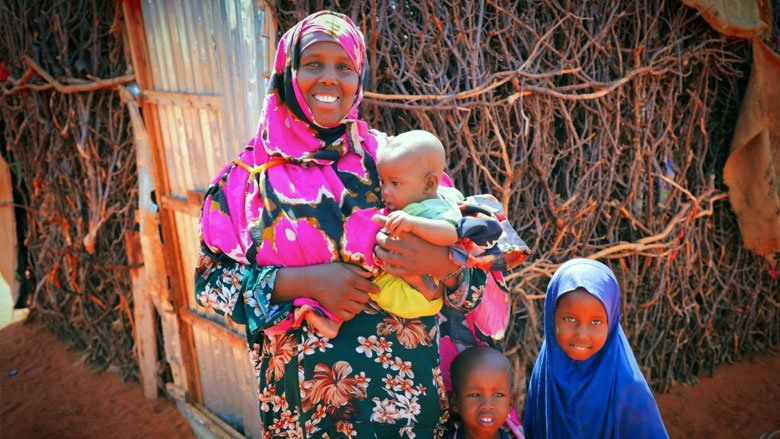[ad_1]
Enabling the Poorest Households to Feed their Families
Across the sub-region, social protection programs have been essential to enable households to cope with high food prices and localized shortages. The poorest households are the most vulnerable since they spend the largest share of their income on food.
In Somalia, “the Baxnaano program came to us at a right moment,” relates Ms. Nishey Mohamed Kheyre, a mother of eight, living in the Bakool region. “Our livelihood was mainly dependent on farming, but we have been impacted in recent years by bad harvests and locust infestation. We have been getting assistance for some time now, and the money I got was used to purchase food, clothing, and pay school fees for my children who are currently attending school in Xuddur. I was even able to buy some chickens for our household and sell the eggs for income.”
Baxnaano direct beneficiary woman with her three children. Photo credit: Ministry of Labor and Social Affairs (MoLSA).

Since its launch in 2019, Baxnaano has provided a platform for the Federal Government of Somalia (FGS) to play a new and continuing role in social safety net provision to households facing chronic poverty and the aggravating impacts of multiple climate-related shocks. More than 1 million people (about 9% of the population) have received nutrition-linked unconditional cash transfers to meet basic consumption needs.
Baxnaano’s built-in shock-responsive features protected food security and livelihoods of an additional 600,000 people from a major 2020 locust outbreak through temporary scale up of the regular program and delivery of emergency cash transfers (ECTs). By laying the foundations of the first state-led social safety net system in Somalia, Baxnaano has worked to help restore citizens’ trust in state institutions and contribute to the FGS’ state-building efforts.
The pandemic also increased the vulnerability of urban households previously left out of social protection programs. In the Democratic Republic of Congo (DRC), the Solidarity by Economic Transfers Against the Poverty in Kinshasa or STEP-KIN program stepped up to protect urban households suffering from food insecurity and loss of livelihoods. STEP-KIN set up a cash transfer program from scratch, using a combination of digital tools to overcome a severely data-constrained environment to target and deliver cash transfers to vulnerable households in Kinshasa. The emergency digital cash transfer program identified, registered, and paid more than 270,000 individuals in 100 poor neighborhoods, becoming the largest cash-based operation in Kinshasa.
Catherine Eswabo, a doughnut seller, was one of the beneficiaries. She wonders how her family would have survived without the program. “The cash was the only means for my family to stock up on corn flour, rice, and oil during lockdown, leaving the rest to the vagaries of day-to-day coping,” she said. “Now that wheat flour price has doubled, my doughnut business is wrecked, my family desperately needs assistance to cope with rising food prices.” Mrs. Eswabo’s family now only relies on the income of her husband, a motorcycle taxi driver whose business is increasingly disrupted by repetitive fuel crisis. The next phase of STEP-KIN will reach an additional 250,000 beneficiaries.
[ad_2]
Source_link

